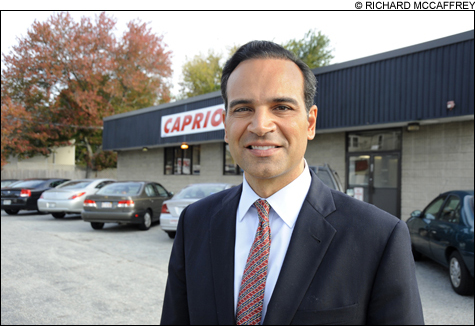
ON MESSAGE Caprio has focused relentlessly on job creation. |
It was the highlight of Democrat Frank Caprio's bid for governor: an endorsement by Bill Clinton before an enormous American flag at the Rhode Island Convention Center.
"He intuitively understands what has to be done to fix this economy," said the former president, in a tidy recitation of Caprio's message destined for a campaign ad a couple of months later.
That the gubernatorial hopeful would make Clinton a symbol of his bid for the corner office makes eminent sense: Bubba is a died-in-the-wool Democrat, charismatic, a bit rakish — perfectly suited to the Rhode Island sensibility.
And Clinton's 1992 campaign for the White House serves as a sort of template for Caprio's bid. Like Clinton before him, the candidate is promising a moderate brand of governance and an obsessive, recession-era focus on jobs; if there is no sign at Caprio's Johnston headquarters declaring "it's the economy stupid," it's only because no one on his team needs reminding.
But there is a crucial difference between the two campaigns: Clinton made his bid on a national stage, with his sights set on the voters of Ohio, Florida, and other purple redoubts. Caprio is running as a centrist in what might be the bluest state in the nation.
And with just a couple of weeks left until Election Day, and the polls showing Caprio in a dead heat with independent Lincoln Chafee, it is far from certain that the candidate's brand will sell.
'REAL CONCERN'
There is, of course, an argument to be made that Caprio's message is perfectly tuned to the moment. The recession, particularly brutal in Rhode Island, has created intense anxiety among the electorate.
And the candidate's central talking point — turning government into an advocate for small business — aligns his campaign with a private sector considerably more popular than the public sector right now.
Moreover, if Caprio's right-of-center politics put him at risk in a left-of-center state, he's already made it through what should have been his most vulnerable period: the Democratic gubernatorial primary, which features a far more liberal electorate than the general election.
But left-leaning Lieutenant Governor Elizabeth Roberts, who might have posed the biggest primary threat to Caprio, decided to pass on the race. And his remaining Democratic foe, Attorney General Patrick Lynch, never caught fire with progressives.
Lynch, who quit the race before primary day, came from a family of old-line, middle-of-the-road politicians. And his lurch to the left was unconvincing for progressives already eyeing a more appealing, general election alternative: Chafee.
Indeed, Chafee — a former Republican senator who quit the party after his defeat in 2006 and later endorsed Barack Obama for president — has managed to garner the support of several large unions and environmental groups that have almost reflexively backed Democrats for decades.
And while labor's talents in getting voters to the polls are often overstated, there is reason to believe the unions could be a real asset this time out. In September, labor officials knocked on hundreds of doors around the state and were able to knock off several conservative state legislators in the Democratic primaries — Caprio's brother David among them.